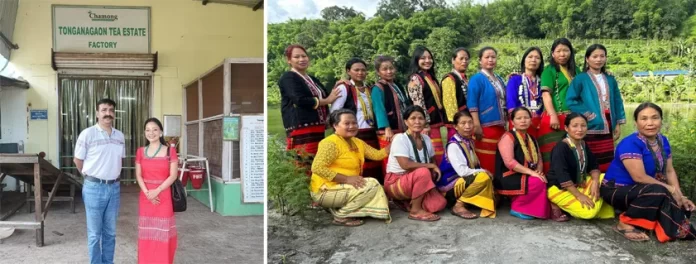[ Mornya Gangkak ]
Introduction
The organic farming revolution in Upper Siang district of is a remarkable story of how a small group of women from Yingkiong circle, inspired by their courage and spirit to learn about organic farming, have helped to create more awareness on organic farming and the ill effects of inorganic farming.
Today, with their teamwork and awareness programmes on organic farming, more people have joined hands, making it the dawn of a revolution in organic farming in Upper Siang.
Farmers’ view
Totok Libang, a state gold medalist for best performance in agriculture and allied sector, is an inspiration to many. He follows the integrated farming system, which includes paddy-cum-fish culture and vegetable cultivation, and he produces his own vermicompost, as well.
He uses solar power to dry the vegetables and fruits, in order to preserve them for a longer time. He also grows organic green tea and wants to acquire organic certification.
Opet Miyu has been growing kiwi for the last eight years. However, selling all her products locally does not fetch her as much income as the kiwis from Zero 2 in Lower Subansiri district, as she does not have organic certification.
According to her, there is enough space to grow and increase the cultivation “but the farmers are mostly unaware.”
Ampi Liper and Gyan Boli grow orange, pineapple, pearl onion and other horticulture crops whose cultivation is highly productive. Pearl onion, locally known as ‘dilap’, is one of the best vegetables commonly grown in Upper Siang. It is very easy to cultivate and it has certain properties which make it immune to pest attacks and even mithuns do not eat it.
The pearl onion found here is much bigger and better tasting than those found in other parts of Arunachal Pradesh.
Visit to Tongonagaon tea estate
Recently, I visited the Tongonagaon Tea Estate, located in Tinsukia district of Assam, which cultivates tea in 550 hectares of land. It also has 17 units in Darjeeling. It is India’s largest producer of orthodox organic tea, organic green tea and organic CTC tea.
I was welcomed by Alok D Jakhmola, general manager of the tea estate, and was shown around the factory to view its functioning and the various machinery and processes involved.
After my visit, the chairman of Lamkang Society Aloti Boli, and the chairman of APFD Society Totok Libang, along with a few others were very inspired by the production technology. They are of the view that they have enough space in Upper Siang district to cultivate tea, but due to lack of factories, the crop plucking and production are low, as plucking of tea leaves is directly proportional to the rate of production.
After viewing a video of tea plantation in Upper Siang, the general manager of Tongonagaon Tea Estate, Alok D Jakhmola, stated that the plants are very healthy but the plucking is irregular.
Support from government
Currently, local MLA and Health Minister Alo Libang is supporting the farmers and is ready to do anything possible to support this initiative. We have also received support from Tadum Libang, chief adviser of the Lamkang Society and president of the ABK (Apex).
Conclusion
If organic farming is a success in Arunachal Pradesh, the farmers will be enabled and it will also help the future generation to earn sustainably, while ensuring food security for both suppliers and consumers. This initiative will only be possible when there is support from the government of Arunachal Pradesh and other bodies.
According to the 2011 census, the total population of Upper Siang was 40,008. In Yingkiong circle, a total of 22 cases of cancer have been known, out of which only two cases have been registered in the general hospital in Yingkiong and the remaining data have been collected locally.
Healthwise, there have been 22 cases of cancer in the last five years, of which only two have been registered in the general hospital in Yingkiong, Upper Siang district.
The data of the other 20 have been collected locally by the farmers.
Recommendations
The government of Arunachal Pradesh should provide financial and technical assistance to the farmers to help them switch to organic farming.
The government should also help to set up organic processing and marketing facilities in the state.
Awareness programmes on organic farming should be conducted for farmers and consumers.
The government should also work to promote organic products from Arunachal Pradesh in domestic and international markets.
Additional thoughts
The organic farming revolution in Upper Siang district is a shining example of how sustainable agriculture can be a win-win for everyone involved. Farmers benefit from increased income and better health, consumers benefit from access to safe and nutritious food, and the environment is protected from the harmful effects of synthetic pesticides and fertilisers.
I am particularly impressed by the work of Totok Libang, Opet Miyu, Gyan Boli and Ampi Liper. These farmers are pioneers in the organic farming movement in Upper Siang district. Their dedication and hard work are an inspiration to us all.
I am also grateful to the government of Arunachal Pradesh for its support to organic farming. I hope that the government will continue to support this important initiative in the years to come.
I urge other governments and stakeholders to follow the example of Upper Siang district and support the transition to organic agriculture. It is the best way to ensure a sustainable future for our planet and our people. (The contributor is chief consultant on organic farming, Upper Siang district.)




